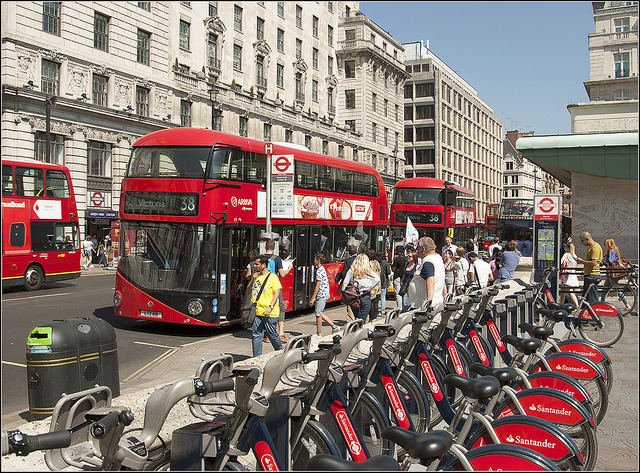This week’s ten biggest climate innovation stories - June 23

Can Sweden go carbon neutral by 2045? Can London’s transport get to zero emissions by 2050? And could the UK start using its sewer network to heat homes?
This, and more, in the week’s ten biggest climate innovation stories.
1. London’s entire transport system to be zero emission by 2050, pledges Sadiq Khan
London’s transport system will become zero emission by 2050 under radical plans outlined by the mayor, Sadiq Khan. Included in the blueprint is a pledge to cut the number of car journeys by three million each day while increasing the number of people walking, cycling or using public transport to 80 per cent by 2041 – up from 64 per cent last year.
2. EU will fail Paris climate challenge unless it tackles heating and cooling
The European Union’s fight against global warming is doomed to fail unless decisive action is taken to change the way we heat and cool our buildings. In EU households heating and hot water make up about 79% of energy use. “In order to fulfill the EU’s climate and energy goals, the heating and cooling sector must sharply reduce its energy consumption and cut its use of fossil fuels,” the European Commission says.
3. IKEA aims to halve food waste at its restaurants by mid-2020
IKEA runs one of the world’s biggest restaurant chains, and aims to halve its food waste in three years to save money and reduce its environmental footprint. A scheme launched in December at 84 of its restaurants measured what was thrown away, and at what time of the day and week, has resulted in 79 tonnes less food waste as the amounts it cooked were better tailored to demand. “Based on an average dish price of five euros we have avoided throwing 880,000 euros in the bin,” Magnusson said of the initiative, which will now be rolled out across all markets.
4. Bank of England to probe banks’ exposure to climate change
The Bank of England will probe banks’ exposure to climate change as it steps up efforts to tackle what it says are “significant” financial threats posed by global warming. Climate change experts said the decision to do an internal review of the banking sector, which the central bank revealed on its website on Friday, marked a first.
5. London could be getting its first ultra-green, tidal-powered school
Plans for what could become London’s greenest building – a tidal powered school situated on the banks of the Thames River have been unveiled. The five-story building would be entirely powered by energy harvested from a series of large turbines built underneath the waterway.
6. Sweden passes climate law to become carbon neutral by 2045
The legislation, which takes effect from 1 January 2018, takes a similar form to the UK’s 2008 Climate Change Act. It establishes an independent Climate Policy Council and four-yearly cycle for updating the national climate action plan.
7. Swedish pension fund sells out of six firms it says breach Paris climate deal
Sweden’s largest national pension fund, AP7, has sold its investments in six companies that it says violate the Paris climate agreement, a decision environmentalists believe is the first of its kind.
8. HFCs: Some supermarkets in for a nasty surprise in 2018
The adoption of climate-friendly cooling technology is on the rise in Europe – but some tardy retailers are heading for a major financial shock when drastic cuts in supplies of hydrofluorocarbons (HFCs) kick in.
Read more on EIA International
9. Britain’s Century-Old Sewer Network Seen as Source of Green Heat
The U.K.’s sewer system, built in the 19th century to halt cholera epidemics, may play a role in tackling climate change as it unfolds as the environmental crisis of the next 100 years. Some of the pipes in Britain’s 624,000-kilometer (388,000 miles) sanitation network can get as warm as 21 degrees Celsius.
Read more on Bloomberg New Energy Finance
10. Storage ‘not fundamentally needed’ for future power grid, scientists say
The emergence of household batteries, along with small-scale solar photovoltaic and plug-in electric cars, is slated to transform electricity storage, according to a new state-of-the-art report by European science academies. But experts claim storage is not actually fundamentally needed.
The post This week’s ten biggest climate innovation stories — 23 June appeared first on Daily Planet powered by Climate-KIC.
News published on Climate KIC
Consult the source



